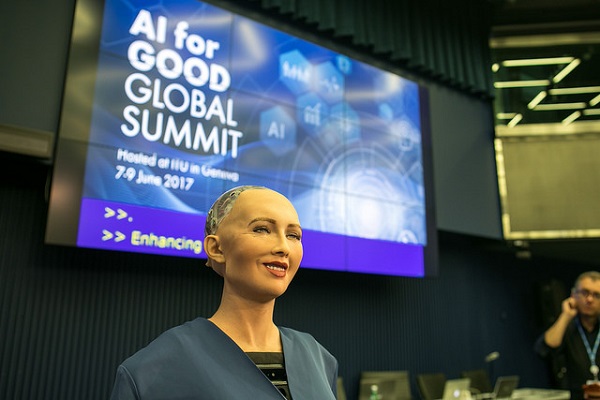
Can a Robot be Religious?
- By Alison Lesley --
- 15 Nov 2017 --

Many believe in a robot-led technological apocalypse
Saudi Arabia's vision is firmly towards the future.[/tweetit] As a part of the Vision 2030 initiative, the kingdom envisages the construction of Neom, an international trade center on the Red Sea shores. The facility will be fully operated and also inhabited by scores of artificially intelligent (AI) bots. The 2017 rollout of future Neom took the shape of Saudi Arabia granting citizenship to Sophia Robot. The latter, as its name suggests, is a talkative AI android crafted and programmed in Hong Kong-located Hanson Robotics Lab.
Can a Robot be Religious?[/tweetthis]
Sophia comes with a total of 62 facial expressions designed to mimic a human. She will look in the eye of the human who is chatting with her to memorize that person's face. She can wink to put any human at ease. During the conference where she was unveiled, Future Investment Initiative, she also showed wit, cracking jokes concerning fears about robots as articulated by Elon Musk and about the destruction of humankind by AI.
Many have pointed out that Sophia, other than a robot, is also a non-Muslim, thus making it ineligible to get Saudi citizenship. This is debatable as the country's immigration laws do not explicitly state that the applicant for citizenship must be a Muslim. A few theologians could provide the argument that an advanced AI could possibly be religious. One Christian thinker, Kierkegaard, said that the religious truth is supported by passion and not proof. True belief cannot happen if a person applies logic and reason. A machine can hardly take such technological leaps.
Hello Sophia, the artificially intelligent robot pic.twitter.com/T4ZAVxiy5O
— Spencer Muparutsa (@spencermoses) November 9, 2017
There is also the question of relationships and also reproduction. Since Sophia is a Saudi citizen, can she 'marry' or even 'breed' if she wants to? Efforts are underway by North Dakota State University students to create a robot which can self-replicate utilizing 3D printing methodologies. Such a scenario can only be a reality if more robots are built to work and function besides Sophia. These machines must also become citizens. Since every citizen has the right to vote, a large number of robots could bring about change in society.
The question of whether robots could be adherents of a particular religion could depend on the religion they are being programmed for. Many technologists believe in the Singularity doctrine apocalypse. They fear that the internet could evolve into a superior AI and then enslave the human race. If robots can write their own Bibles, it remains to be seen the position of humans in that book.


















